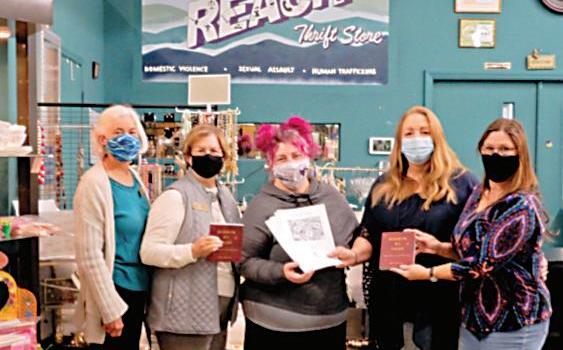
7 minute read
Opinion
Opinion A country coming to grips with real problems
BY MARY JANE CURRY GUEST COLUMNIST
This a reply to a letter by David Parker that appeared in the March 31 issue. The matters discussed are continually relevant.
From whom in our local schools did you hear about the “violations of common sense,” the assaults on national respect you mention? What courses in the state university curricula are you unhappy with? What are your sources, Mr. Parker? Have you asked to visit some university classrooms?
As a retired K-12 and later a university teacher, I do agree that some teachers use their bully pulpits to try to sway students to their political/religious sides. This happens with both right-wing and left-wing teachers. However, in my experience from 1972 through 2014, they are a small minority. Nor do their attempts have much effect.
My husband is a retired college professor of mathematics education and mathematics. Nobody ever suggested in any of his classes or in his own training to teach math and math ed that math is “racist to some as it stresses getting the right answer,” as you claim. Who told you this, the late Rush Limbaugh, perhaps Tucker Carlson?
To cut funding for public education is to throw the baby out with the bath water. People educated in public universities become most of our health professionals, our accountants and bankers, businesspeople, and other professionals on which our communities depend.
You assert, “The task of passing on our civilizational inheritance has been abandoned in favor of denigrating our past and rejecting our ancestors’ accomplishments.” To the contrary, history teachers have increasingly stopped omitting or suppressing the contributions of ancestors — those who happened to be women and people of color. When I was a student in the next-to-last segregated class in my high school in Selma, Alabama, in the mid-1960s, my American history teacher insisted that the only reason the South seceded from the U.S. was “states’ rights,” not slavery. Nobody with eyes, ears, and a brain swallowed that chunk of moldy baloney. Were the accomplishments of Booker T. Washington, George Washington Carver, Tecumseh, Sequoyah, Lewis H. Latimer, Patricia Bath, George Carruthers taught in that Alabama public school? The first two got a sentence or two, but we never heard anything about the rest of them. Have your children?
As a middle-class white girl in the Deep South, I didn’t need to be taught “critical race theory.” All by myself, I figured out that my neighbors in Selma, Dallas County, Alabama, and much of the nation I was born in and loved were infected with racism against people who weren’t part of the white upper-middle to upper-class ruling class. Too often, those racists exercised the power of life and death over others.
I saw racism and sexism, too — and heard it, felt it, smelled it — and it repelled me from the first time I sensed it. My beloved grandfather told me I shouldn’t be friends with another girl I’d just met in third grade because she was a “wop” (Italian). I had no idea what the word meant, but I’ll always recall the nauseating feeling that hit me when he said it. But I still loved him; what he remembered was that Mussolini sided with Hitler in World War II. He never traveled more than 50 miles from his rural Western Kentucky farm and never met an Italian.
Like some today, he generalized the acts of leaders far away to a whole nation or ethnic group. Making false generalizations is why the brainwashed benighted are beating or shooting Asian American children, men and women, even the elderly. Would you not report this shameful American moral epidemic because it doesn’t fit your image of America?
Do we ignore the long epidemic of racist violence against Black people? As a local head of police told The Smoky Mountain News last year in an article on police violence, “Nobody hates a bad cop more than a good cop.” We in Haywood County and its towns are fortunate in having good cops. I wish they had time to teach law enforcement ethics nationwide.
My husband will always remember the sawed-off shotgun in his face, summer of 1969; it was held by a man showing a Northport, Alabama, police badge under his KKK robe. He and his comrades burst into an apartment where my husband was visiting, along with a friend from high school who happened to be Black. The cop said, “You got any n_____ in here?” He said no. Fortunately, his high school friend had been upstairs and seen them coming; he hid in the bathroom closet.
I’ll always recall Janie, a cute, friendly girl my age dashing into the Wilby Theater where I was working on Bloody Sunday. With terrifying glee, she shouted “They’re beating the n___! They’re beating the n___!” It sickens me still.
Certainly, failures and outright violations of human and civil rights are taught today. Teaching where Americans failed to live up to our ideals does not cancel out the accomplishments of those who have done much good for our nation. Rather, it gives us a realistic picture of where we came from so we can draw a reliable map to a better place for the future.
The overall goals of university and college education are, or should be, to teach people to think rationally and to conduct reliable research. These aren’t the only goals, of course, but they should inform every course.
My second career was teaching college-level English. I was trained to teach at a state university. My training never pushed some of the absurd ideas Mr. Parker cites. When I taught English at a Southern Baptist university, most of my students’ views were the opposite of mine on several controversial issues. I know this because the freshman English text book was organized by hot-button issues, with readings taking both sides of each issue. For essay assignments, a student could choose either side. Essays whose views differed from mine were graded according to such criteria as supporting arguments with valid sources, making arguments that were rational, and using emotional appeal in principled ways (avoiding the logical fallacies that have been taught since Aristotle and used so effectively by some politicians and TV “commentators”). Students’ views didn’t affect their grades, nor did my opinions or theirs get mentioned in class unless they were directly relevant to the subject matter. We distinguished between personal beliefs and provable facts. They learned to use reliable sources.
When you write a letter or op-ed, what and who are your sources? Inquiring minds want to know. (Curry lives in Haywood County. currycei@gmail.com).
Honoring our healthcare heroes
What is a hero? Maya Angelou famously said, “I think a hero is any person really intent on making this a better place for all people.”
In my role as CEO of Haywood Regional Medical Center, I have the privilege of working with an incredible team of healthcare heroes who work tirelessly, each and every day, to make our hospital and our community a better place.
Every May, hospitals and communities across the country recognize and celebrate these frontline healthcare heroes over the course of several weeks: National Nurses Week, National Hospital Week and National Emergency Medical Services (EMS) Week. Like many other milestones we’ve experienced during the COVID-19 pandemic, this year’s celebrations are especially meaningful.
I’m grateful for the more than 925 team members who serve at Haywood and the many paramedics, EMTs and EMS personnel who play such a critical role in helping our community members get the safe, excellent care they need. They are living examples of what it means to be heroes who are focused on making our community a better place through their service to our friends and neighbors. When I think of everyday heroes, I think of our environmental services team members who take pride in ensuring our patients and their families are cared for in a safe and clean environment. I think of our food service and nutrition staff who prepare healthy and comforting meals for our patients while they are away from home. I think of our admitting team members who welcome patients and visitors to our hospital with their kindness and friendly smiles. I think of our dedicated caregivers, technicians, nurses, technologists, therapists, physicians and others who demonstrate excellence and compassion in all that they do. I also think of our EMS partners who remain calm under immense pressure, providing critical care when every minute counts.
Our local healthcare heroes are truly living out our hospital’s mission to make our community healthier. Importantly, their focus and dedication has played a critical role in helping us to make strong progress towards improving COVID-19 here in our community. While we must continue to stay diligent in doing all that we can to fight the pandemic, I know we are all encouraged by the progress we are making together.
As we celebrate this year, I hope you will join me in sharing your thanks and appreciation for the everyday heroes among us. Haywood Regional Medical Center is honored to serve this community and we are here for you and your family when you need us. (Greg Caples is CEO of Haywood Regional Medical Center).
Greg Caples Guest Columnist








